Philhellenism (Byron) Day
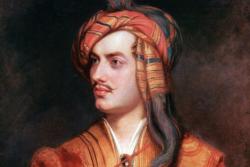 On Friday 19th April 2024, Greece celebrates 'Philhellenism Day', in recognition to all the foreigners who love Greece and Greek culture. This annual celebration was originally called 'Byron Day', as this day is the bicentenary of the death of the English romantic poet and Philhellene Lord George Gordon Byron, who died defending the Greek stronghold of Missolonghi from the Ottoman Turks on 19th April 1824. Philhellenism was originally an intellectual movement prominent mostly at the turn of the 19th century. It contributed to the sentiments that led Europeans such as Lord Byron, Charles Fabvier and Richard Church to advocate for Greek Independence from the Ottoman Empire. Later European philhellenism was to be found among the Classicists and interest in the artistic Neoclassicism movement.
On Friday 19th April 2024, Greece celebrates 'Philhellenism Day', in recognition to all the foreigners who love Greece and Greek culture. This annual celebration was originally called 'Byron Day', as this day is the bicentenary of the death of the English romantic poet and Philhellene Lord George Gordon Byron, who died defending the Greek stronghold of Missolonghi from the Ottoman Turks on 19th April 1824. Philhellenism was originally an intellectual movement prominent mostly at the turn of the 19th century. It contributed to the sentiments that led Europeans such as Lord Byron, Charles Fabvier and Richard Church to advocate for Greek Independence from the Ottoman Empire. Later European philhellenism was to be found among the Classicists and interest in the artistic Neoclassicism movement.
Of all the figures of Philhellene 'lovers of everything Greek', Lord Byron holds the highest admiration and love of the Greek people.
Lord Byron visited Greece in 1809 and sailed for Constantinople in 1810, visited the site of Troy, and swam the Hellespont (today's Dardanelles) in imitation of Leander. Byron’s sojourn in Greece made a lasting impression on him. The Greeks’ free and open frankness contrasted strongly with English reserve and hypocrisy and served to broaden his views of men and manners. He delighted in the sunshine and the moral tolerance of the people. After returning to England, in March 1812 the first two cantos of Childe Harold's Pilgrimage were published, and Lord Byron “woke to find himself famous". The poem describes the travels and reflections of a young man who, disillusioned with a life of pleasure and revelry, looks for distraction in mysterious foreign lands.
Byron then spent his time visiting various central European and Mediterranian countries, writing the first few cantos of Don Juan. In April 1823 he agreed to act as agent of the London Committee, which had been formed to aid the Greeks in their struggle for independence from Turkish rule. In July 1823, Lord Byron left Genoa for Cephalonia, sending £4,000 of his own money to prepare the fleets of Hydra and Spetses for active service. Arriving in Cephalonia (Kefalonia) Byron made efforts to unite the various Greek factions which drove Byron to distraction, he complained that the Greeks were hopelessly disunited and spent more time feuding with each other than trying to win independence. In dispair and frustration, he then set sail for Missolonghi on 29th December 1823.
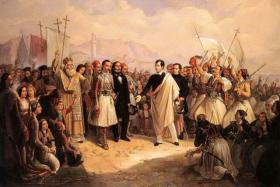
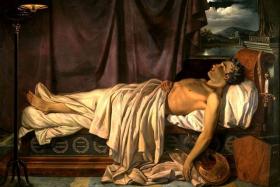
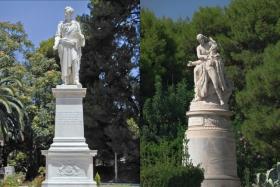 Byron's arrival at Missolonghi The deathbed of Lord Byron Statues of Lord Byron in Greece
Byron's arrival at Missolonghi The deathbed of Lord Byron Statues of Lord Byron in Greece
On arrival at Missolonghi on 5th January 1824, Byron joined Prince Alexandros Mavrokordatos, leader of the Hellenic forces in Western Greece. He took personal command of a brigade of Souliot soldiers, reputedly the bravest of the Greeks. By the end of March 1824, the so-called 'Byron Brigade' of 30 philhellene officers and about 200 men had been formed, paid for entirely by Lord Byron. But a serious illness in February had weakened him, and in April he contracted the fever from which he died at Missolonghi on Monday 19th April 1824. Deeply mourned, he became a symbol of selfless patriotism and a Greek national hero. The Hellenic stronghold of Missolonghi finally fell on 10th April 1826, after a year-long Ottoman seige, following a failed mass breakout attempt.
Today, Lord George Byron is commemorated in Messolonghi by a cenotaph containing his heart, and a statue located in the town, with streets named after him around Greece. For Greeks, Λόρδος Βύρωνας as he is called, epitomised the principal concept of Philhellenism because he died at the age of 36 for the freedom of a homeland that was not even his own. Byron was also a bitter opponent of Lord Elgin's removal of the Parthenon sculptures in 1801-05, denouncing the “theft” in the poem The Curse of Minerva.
Lord Byron himself had vowed that if Greece should fall, “I will bury myself in the ruins.” His early death was also met with deep sorrow and mourning throughout Europe. His body was returned to England for burial, but his heart would always remain in Greece. He was a literary legend and a symbol of the fight for freedom. His legacy will continue to inspire generations to come.
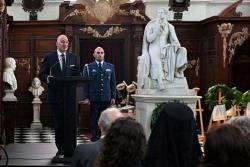 Greek Defence Minister, Nikos Dendias, and Greek Deputy Minister of Culture, Christos Dimas, attended a two-day festival at Trinity College Cambridge in England to mark the bicentenial of Lord George Byron's death at Missolonghi in Greece. Byron was a student at Cambridge and is one of its most celebrated alumni. During his speech, The Greek Deputy Minister talked about the work and life of Lord Byron, his love for Greece, his contribution to the 1821 Revolution and his contribution to spreading the wave of Philhellenism across Europe. Dimas stated that Byron was the first to raise the issue that the Parthenon sculptures were 'looted' by Lord Elgin at the beginning of the 19th century, and informed the audience about the ongoing Greek efforts for their repatriation from the British Museum.
Greek Defence Minister, Nikos Dendias, and Greek Deputy Minister of Culture, Christos Dimas, attended a two-day festival at Trinity College Cambridge in England to mark the bicentenial of Lord George Byron's death at Missolonghi in Greece. Byron was a student at Cambridge and is one of its most celebrated alumni. During his speech, The Greek Deputy Minister talked about the work and life of Lord Byron, his love for Greece, his contribution to the 1821 Revolution and his contribution to spreading the wave of Philhellenism across Europe. Dimas stated that Byron was the first to raise the issue that the Parthenon sculptures were 'looted' by Lord Elgin at the beginning of the 19th century, and informed the audience about the ongoing Greek efforts for their repatriation from the British Museum.
The Deputy Minister finally reminded the assembly that the Greek Ministry of Culture has declared 2024 the 'Year of Lord Byron'.
The Acropolis Museum will honour Lord Byron's memory with a small symbolic exhibition titled 'The Parthenon and Byron' which will open on Friday 26th April 2024, related to Lord Elgin's seizure of the Parthenon Sculptures. Lord Byron's last words before he died are said to have been about his beloved Greece. "I gave her my time, my health, my presence, now I am giving her my life. What more could I have done?"